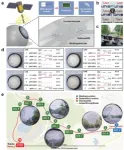(Press-News.org) A novel type of therapy, known as ANGPTL3 inhibitor therapy, was effective in lowering triglycerides in certain types of patients with severe hypertriglyceridemia (sHTG) who had a prior episode(s) of acute pancreatitis. sHTG is a well-established risk factor for recurrent episodes of acute pancreatitis. These high-risk patients were the focus of a phase 2 study that was led by the Icahn School of Medicine at Mount Sinai and sponsored and funded by Regeneron.
This ANGPTL3 inhibitor therapy, the intravenous drug evicanumab-dgnb, inhibits two important regulators of lipoprotein metabolism. The research, published March 6, in Nature Medicine, found that evinacumab reduced triglycerides by as much as 70 percent in people with sHTG who had at least some lipoprotein lipase (LPL) activity, the key enzyme in triglyceride metabolism. However, in one of the three groups of sHTG patients with genetic mutations resulting in no LPL activity—a rare condition known as familial chylomicronemia syndrome—evinacumab was ineffective in lowering triglycerides. In the other groups, the triglycerides were reduced by a median of 65 to 82 percent. Although the primary endpoint of a reduction in triglycerides did not meet the prespecified significance level, many other triglyceride endpoints were positive.
“In many ways we are encouraged by the results of the study,” says lead author Robert S. Rosenson, MD, Director of Lipids and Metabolism for the Mount Sinai Health System, and Professor of Medicine (Cardiology) at Icahn Mount Sinai. “In patients with no residual lipoprotein lipase activity we wouldn’t have expected evinacumab to be effective since there is no enzymatic activity present to disinhibit. But in the broader population of sHTG patients, those with multifactorial chylomicronemia syndrome, it worked profoundly well. Even when the primary endpoints were not met—in familial chylomicronemia syndrome patients—we observed favorable changes in lipid and lipoprotein levels along with safety benefits that warrant further evaluation of this class of inhibitors in larger trials.”
Acute pancreatitis resulting from sHTG impacts 50 to 80 thousand people a year in the United States. It is a significant cause of morbidity, mortality, and reduced quality of life, as well as being a financial burden on the health care system, with patients often experiencing repeat attacks, requiring recurrent hospitalization. Therapeutic approaches to sHTG include weight loss, dietary counseling, lipid l-lowering medicines called fibrates, and omega-3 fatty acids, though none have proven sufficient to reduce triglycerides and prevent acute pancreatitis in a substantial number of patients.
Evinacumab was approved by the U.S. Food and Drug Administration in 2021 as an adjunct to other LDL-lowering therapies for treating patients with homozygous familial hypercholesterolemia, a rare, life-threatening condition that causes severely high cholesterol. Its use in lowering triglycerides was investigational and not approved for use. A fully human monoclonal antibody, it binds to and regulates ANGPTL3, an important regulator of lipoprotein metabolism. It disinhibits key enzymes that break down fats in the body, including lipoprotein lipase, which is crucial to triglyceride metabolism, and endothelial lipase, which is involved in metabolism of low-density lipoprotein (LDL), or “bad,” cholesterol.
“The fact that individuals with loss-of-function variants in ANGPTL3 have significantly reduced triglycerides suggested to us that it could be a good therapeutic target for lowering triglycerides by increasing LPL activity,” explains Dr. Rosenson.
Mount Sinai researchers, in collaboration with colleagues from the Perelman School of Medicine at the University of Pennsylvania, also found that evinacumab treatment in patients with sHTG reduced levels of ApoC3, another important regulator of triglyceride metabolism, by 60 percent. Patients with sHTG typically have increased ApoC3 levels due to elevation of triglyceride-rich lipoproteins carrying ApoC3. Moreover, the class of ANGPTL3 inhibitors lower levels of apolipoprotein B, a large protein that serves as the backbone of LDL cholesterol and potentially the risk for heart disease. “We’re particularly encouraged by the reduction we saw in apolipoprotein B, and therefore the potential of this class of inhibitors to prevent cardiovascular events,” says Dr. Rosenson. The effects of evinacumab on cardiovascular morbidity and mortality have not been determined.
“We know that therapies that lower triglycerides without reducing apolipoprotein B do not provide a cardiovascular benefit,” emphasizes Dr. Rosenson. “By significantly impacting both risk factors, ANGPTL3 inhibitors show great therapeutic promise for large populations of patients, which our seminal work is now helping to accelerate for the broad field of clinical research.”
In the study, treatment-emergent adverse events occurred in 71 percent and 69 percent of evinacumab and placebo-treated patients, respectively (a secondary endpoint). Common treatment emergent adverse events occurring in more than 5 percent of patients that were more frequent in the evinacumab group included abdominal pain, headache, constipation, abdominal discomfort, increase in alanine aminotransferase/aspartate aminotransferase (defined as three times the upper limit of normal), back pain, contusion, dizziness, herpes zoster, and sinusitis.
Mount Sinai Heart is one of the world’s top hospitals in Cardiology/Heart Surgery
Mount Sinai Heart is among the top 6 in the nation for cardiology and cardiac surgery, according to U.S. News & World Report. Newsweek’s “The World’s Best Specialized Hospitals” ranks Mount Sinai Heart as No. 1 in New York and No. 4 globally.
It is part of Mount Sinai Health System, which is New York City's largest academic medical system, encompassing eight hospitals, a leading medical school, and a vast network of ambulatory practices throughout the greater New York region. We advance medicine and health through unrivaled education and translational research and discovery to deliver care that is the safest, highest-quality, most accessible and equitable, and the best value of any health system in the nation. The Health System includes approximately 7,300 primary and specialty care physicians; 13 free-standing joint-venture centers; more than 410 ambulatory practices throughout the five boroughs of New York City, Westchester, and Long Island; and more than 30 affiliated community health centers. The Mount Sinai Hospital is ranked in U.S. News & World Report's "Honor Roll" of the top 20 U.S. hospitals and among the top in the nation by specialty: No. 1 in Geriatrics and top 20 in Cardiology/Heart Surgery, Diabetes/Endocrinology, Gastroenterology/GI Surgery, Neurology/Neurosurgery, Orthopedics, Pulmonology/Lung Surgery, Urology, and Rehabilitation.
For more information, visit https://www.mountsinai.org or find Mount Sinai on Facebook, Twitter and YouTube.
###
END
A novel mechanism may be effective in patients with severe hypertriglyceridemia and prior episodes of acute pancreatitis
2023-03-09
ELSE PRESS RELEASES FROM THIS DATE:
Researchers unveil smart contact lens, capable of implementing AR-based navigation
2023-03-09
With the advent of the Metaverse era, there have been growing expectations that virtual reality (VR) and augmented reality (AR) technologies will likely to enhance convenience in everyday life, as well as industry productivity performance.
A joint research team, affiliated with UNIST has introduced core technology for smart contact lenses that can implement AR-based navigation through a 3D printing process. According to the research team, the new smart contact lenses can be worn inside the eye of a person, like a normal contact lens.
Published in the February 2023 issue of Advanced Science, this breakthrough has been jointly led by ...
3D battery imaging reveals the secret real-time life of lithium metal cells
2023-03-09
Innovative battery researchers have cracked the code to creating real-time 3D images of the promising but temperamental lithium metal battery as it cycles. A team from Chalmers University of Technology, Sweden, have succeeded in observing how the lithium metal in the cell behaves as it charges and discharges.
The new method may contribute to batteries with higher capacity and increased safety in our future cars and devices.
“We’ve opened a new window in order to understand – and in the long term to optimise – the lithium metal batteries of the future. When we can study exactly what happens to the lithium in ...
Naturally occurring peptide may tackle the ‘root cause’ of obesity-related conditions
2023-03-09
Research published today shows that a peptide (small protein) called PEPITEM could provide a revolutionary approach to reducing the risk of type 2 diabetes and other obesity-related diseases such as hepatic steatosis (fatty liver).
The researchers used an animal model of obesity to investigate whether PEPITEM, delivered by a slow-release pump, could prevent or reverse the effects that a high fat diet has on the pancreas. Excitingly, the results showed that administration of PEPITEM significantly reduced the enlargement of insulin-producing cells in the pancreas and ...
C-reactive protein reduces the immune response in inflammatory disease
2023-03-09
The biological function of the C-reactive protein, CRP, has long been unknown. Researchers at Linköping University in Sweden now show that this protein has a beneficial function in systemic lupus erythematosus, SLE, an inflammatory disease. But this is true only for one of CRP’s two forms, according to the study published in Journal of Autoimmunity.
Most of us have had a CRP blood test on more than one occasion. This is a very common routine health care test used to detect infection or systemic inflammation in the body. What is measured is the level of C-reactive protein, or CRP for short.
“CRP ...
Study: Higher fracture risk after total hip replacement when cementless implant used to treat femoral neck fracture
2023-03-09
A study by Hospital for Special Surgery (HSS) and other centers found that total hip replacement performed with a cementless prosthesis for a femoral neck fracture led to a higher rate of a second fracture and subsequent revision surgery. The research was presented today at the American Academy of Orthopaedic Surgeons (AAOS) Annual Meeting in Las Vegas. The results were also published online in The Journal of Arthroplasty in October 2022.
Treatments for a femoral neck fracture range from nonoperative management to total hip replacement. When hip replacement is the best treatment option, it can be performed with or without bone cement to secure the prosthesis.
“Femoral ...
Mass General researchers discover the role of intestinal fibrosis in inflammatory bowel disease
2023-03-09
Intestinal fibrosis is a common feature of inflammatory bowel disease (IBD) and the primary cause of end-stage organ failure. Traditionally considered a bystander of inflammation, with negligible involvement in disease pathogenesis, new research published in Gastroenterology now shows that fibrosis has a direct bearing on disease progression in IBD.
The investigation was spearheaded by Nima Saeidi, PhD, Associate Professor of Surgery at the Massachusetts General Hospital (MGH) and Harvard Medical School, along with co-first authors, Shijie He, PhD, and Peng Lei, PhD.
The critical question posed by the investigators ...
Digital rectal examination is not useful to early detect prostate cancers
2023-03-09
A common method of detecting prostate cancer may not be accurate enough as a reliable screening tool by itself, scientists have warned.
The digital rectal exam (DRE) is widely used by medical professionals to check the prostate gland with a finger for unusual swelling or lumps in the rectum as an initial check for the signs of prostate cancer in men.
In some countries, such as Germany, it is the sole method used in a national screening programme for the disease.
But new research by scientists of the PROBASE trial coordinated at the German Cancer Research Center (Deutsches Krebsforschungszentrum, DKFZ) ...
Long Covid is much less likely after omicron than after variant circulating at start of COVID-19 pandemic
2023-03-09
**Note: the release below is a special early release from the European Congress of Clinical Microbiology & Infectious Diseases (ECCMID 2023, Copenhagen, 15-18 April). Please credit the conference if you use this story**
Embargo: 2301H UK time Wednesday 8 March
The omicron variant of SARS-CoV-2 is much less likely to lead to long Covid than the variant circulating at the start of the COVID-19 pandemic, new research being presented at this year's European Congress of Clinical Microbiology & Infectious Diseases (ECCMID 2023, Copenhagen, 15-18 April) suggests.
The Swiss study found that healthcare ...
World’s most comprehensive study on COVID-19 mental health
2023-03-09
COVID-19 has taken a relatively limited toll on the mental health of most people around the globe, according to a paper published today in the BMJ by a McGill University-led research team involving collaborators from McMaster University, the University of Toronto, and other institutions.
The team reviewed data from 137 studies in various languages involving 134 cohorts of people from around the world. Most of the studies were from high or middle-income countries, and about 75% of participants were adults and 25% were children and adolescents between the ages of 10-19.
To their surprise, the researchers found that despite the dramatic stories to the contrary, where ...
Low dose radiation linked to increased lifetime risk of heart disease
2023-03-09
Exposure to low doses of ionising radiation is associated with a modestly increased excess risk of heart disease, finds an analysis of the latest evidence published by The BMJ today.
The researchers say these findings “have implications for patients who undergo radiation exposure as part of their medical care, as well as policy makers involved in managing radiation risks to radiation workers and the public.”
And a linked editorial suggests that these risks “should now be carefully considered in protection ...





